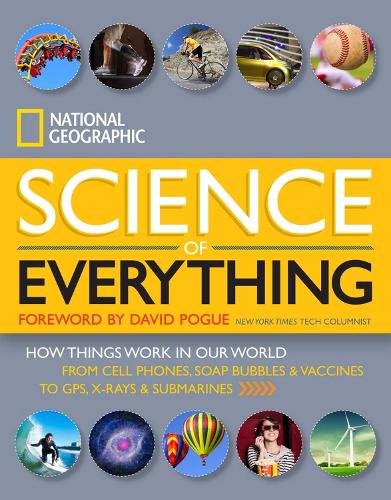
National Geographic Science of Everything: How Things Work in Our World
(Hardback)
Publishing Details
National Geographic Science of Everything: How Things Work in Our World
By (Author) National Geographic
Foreword by David Pogue
National Geographic Society
National Geographic Society
15th November 2014
United States
Classifications
General
Non Fiction
500
Physical Properties
Hardback
400
Width 202mm, Height 254mm
Description
National Geographic answers all the questions about technology, biology, chemistry, physics, math, engineering, computers, and mechanics--in an indispensable book that reveals the science behind virtually everything.How does the voice of a distant radio announcer make it through your alarm clock in the morning How does your gas stove work How does the remote control open your garage door What happens when you turn the key in the ignition What do antibiotics really do Divided into four big realms--Mechanics, Natural Forces, Materials & Chemistry, Biology & Medicine--The Science of Everythingtakes readers on a fascinating tour, using plain talk, colorful photography, instructive diagrams, and everyday examples to explain the science behind all the things we take for granted in our modern world.
Reviews
"With 400 big, glossy pages, this hardback has the heft of a textbook, but with pictures and writing style accessible to anyone--even if your own scientific experiences never went beyond a kitchen-counter volcano of baking soda and vinegar." --The Washington Post
Dedicated to the notion that everything around us has an interesting science tale to tell, this abundantly illustrated, modern-day book of knowledge makes learning fun and makes remembering forgotten science even better! WebWire.com
Author Bio
NATIONAL GEOGRAPHIC is one of the world's leading nonfiction publishers, proudly supporting the work of scientists, explorers, photographers, and authors, as well as publishing a diverse list of books that celebrate the world and all that is in it. National Geographic Books creates and distributes print and digital works that inspire, entertain, teach, and give readers access to a world of discovery and possibility on a wide range of nonfiction subjects from animals to travel, cartography to history, fun facts to moving stories. A portion of all National Geographic proceeds is used to fund exploration, conservation, and education through ongoing contributions to the work of the National Geographic Society. David Pogueis an American technology writer, Emmy Award-winning CBS news correspondent, and bestselling author who founded the website Yahoo Tech. A former New York Times contributor, he also writes the monthly TechnoFiles column for Scientific American and has hosted numerous science shows on PBS. Pogue lives in Connecticut with his wife and three children. To learn more, visit davidpogue.com of follow @Pogue on Twitter.
